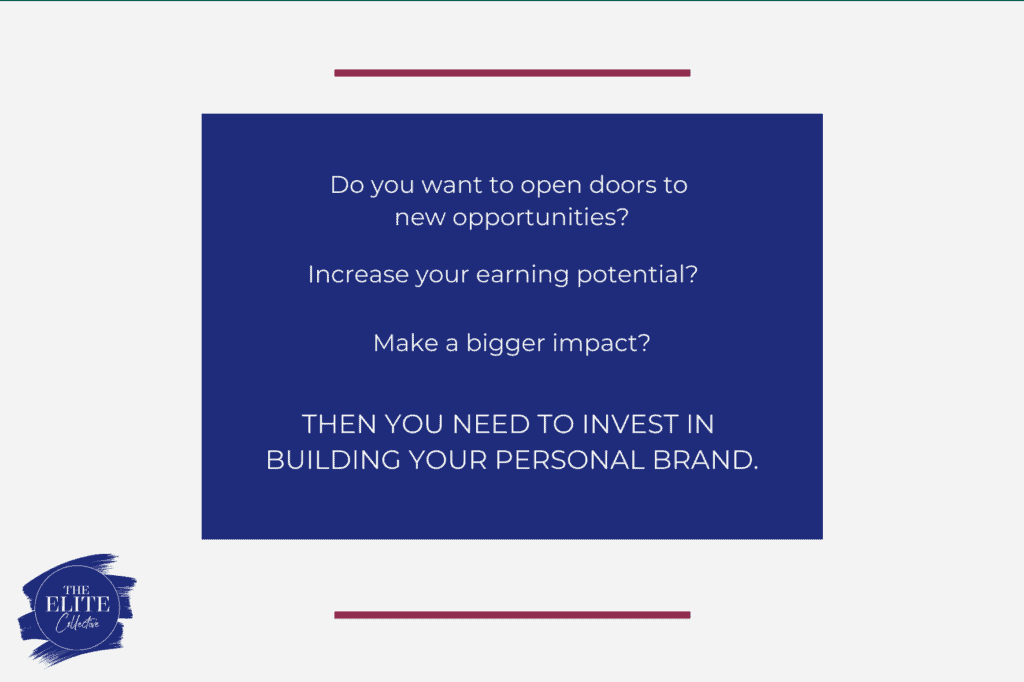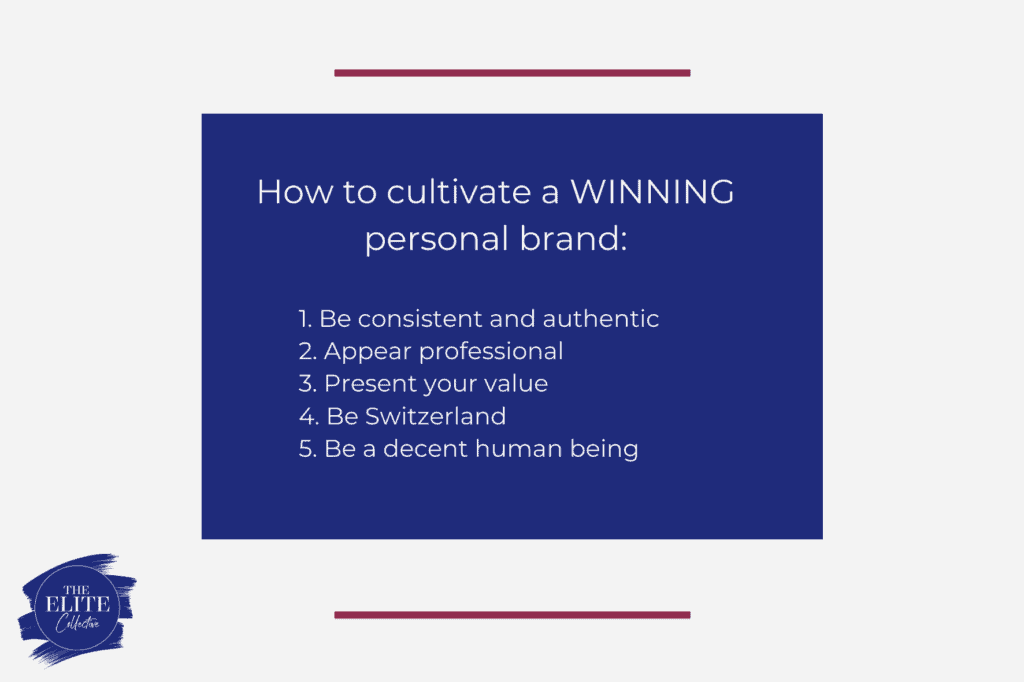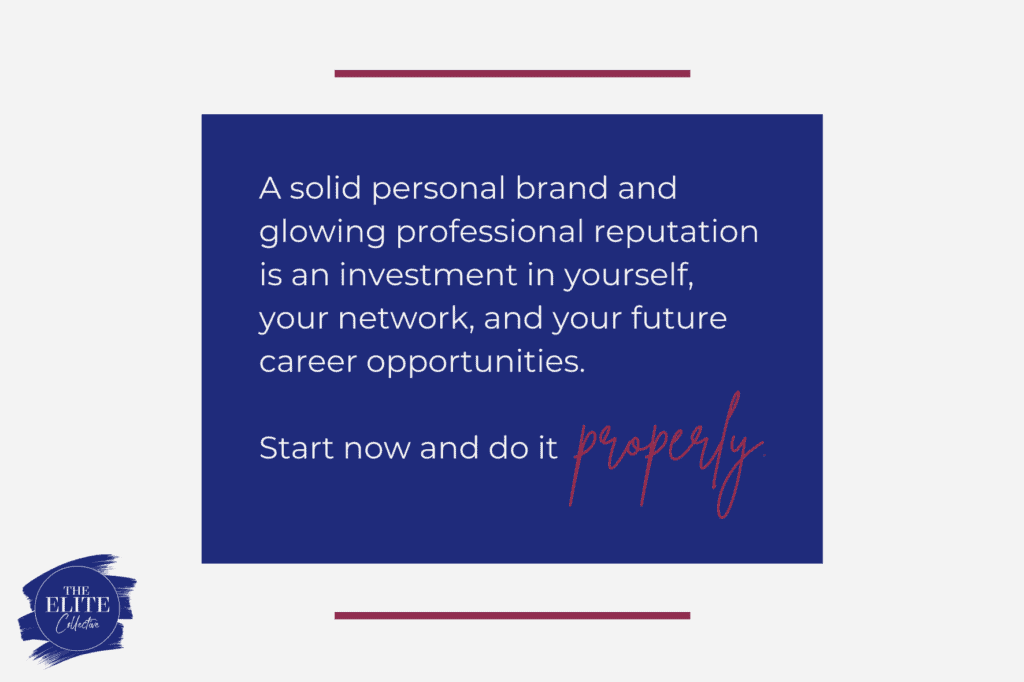 Adriana Modersitzki
Adriana Modersitzki
Want to change or advance your career? Need to stand out in a sea of qualified applicants?
Personal branding might be the answer. Done right, you can use it to strengthen your career and positioning as a job applicant… and get that dream job or promotion. If you’re a professional who wants to go places, it’s well worth a closer look.
In a nutshell, your personal brand is what people say, think, and feel about you. It’s what they associate with your name and image. This could include your skills, personality, background, connections, values, passions, strengths, style, and what others say about you.
Just like your favourite businesses, branding is about what makes the right people like, trust, and “buy” into you.
Although we’re seeing a lot of interest in personal branding lately in the business world, it’s just a new word for an old idea.
I grew up in a small town, and my mum always said to me when growing up, “It doesn’t matter where you go in life, someone will know you, your family, and half of your life story.”
I’ve moved all over Australia and no matter where I’ve gone, it’s proven true!
Your personal brand is about:
Can you see how your personal brand might be relevant as a job applicant or professional?
In my experience as a recruiter who was responsible for a lot of the hiring process, I can tell you for sure that someone’s personal brand WILL affect whether…
I’m going to talk about some key aspects of personal branding for professionals, including why it’s so essential to get right, where your personal brand lives, how to get it right, and how to use it to your advantage in your career.
We’ll get into some super practical advice based on my experience and observations of the best job candidates and personal branding experts. While I can’t promise you’ll get the job, following these steps will help increase your current and future job opportunities.
Okay, let’s get into it!
We’ve already touched on the why, but let’s go a little deeper.
Personal branding is more essential than ever before. It’s no longer enough to have the skills and qualifications for a job because chances are, 10 other applicants do too. You need something extra to set you apart. Job competition is getting stiffer, thanks to offshoring, automation, and cost cutting.
There’s more information available about you online than ever before and potential employers are doing their research to see if you are right for their company.
When you grow your personal brand, it’s an investment in your future. Think about some strong personal brands… Richard Branson, Oprah Winfrey, Michelle Obama. Nearly any door is open to them because of their ability to put themselves out there in a positive way.

First of all, you already have a personal brand – it’s out there whether you like it or not. But it’s time to be more conscious of your brand and ensure that it reflects your goals and professional persona more accurately. Your personal brand is found in a variety of places that (all together) affect what people think about you.
You’d be surprised at how much people can find out about you by just doing a Google search and finding your social media pages, like Facebook, Twitter, LinkedIn, and Instagram. Even if you think everything is set to private, you might be tagged in friends’ updates, have comments on your public profile picture/header image, and other details that can give an impression about you.
Some recruiters use software to pull up any social media account associated with your email address. This can give a lot of insights into an applicant based on what they’ve shared and posted.
It’s also worth doing a Google search to see what websites you appear on, media articles you’re quoted in, and images that come up with your face. If you have a personal website or blog, that’s also another part of your brand, even if it’s not intended for professional use.
Any time you go somewhere, meet, talk to, or connect with others, you build on your personal brand. This includes networking, educational seminars, and even social events. The types of events you go to communicate your intentions, like professional growth, sociability, interests, and openness to new job opportunities.
Using your personal brand to get into your next job opportunity can also be as simple as telling your family and friends that you’re looking for a job, rather than keeping it a secret. You never know when an opportunity might come your way, and a personal recommendation from someone who knows you is more powerful than the most eloquently written resume.
Perhaps the most important part of your brand is what other people say about you (especially when you’re not around).
Of course, the most obvious example of this is what the referees on your resume say about you when the recruiter calls them (hopefully that you were a great employee/colleague!).
But it’s also important to consider word of mouth. What would people say if they were referring you to someone else?
For example, let’s talk about the trades space, an industry that almost entirely relies on word of mouth referrals. A tradie’s personal brand often consists of simple but important things like being respectful, arriving on time, not smoking on the job, cleaning up after themselves, and not leaving rubbish behind.
But really, your personal brand includes what anybody says about you. If your recruiter sees any mutual connections or acquaintances listed on your LinkedIn or Facebook profile, they might take the chance to probe a little deeper and ask them about you. It’s a smaller world than you might think in recruiting!
So, we’ve established that your personal brand is… well, everywhere. It might seem like an impossible beast to wrangle at this point. How are you meant to succeed?! Don’t worry – you’ve got this! I’ve put together a few tips on how you can get your personal brand in ship-shape so that it works in your favour and not against you!
Recruiters can smell a phony from a mile off. Know who you are as a person, know where you’re headed professionally, and make sure that this impression carries through your personal brand. This includes making sure your values are expressed in the same way wherever you are visible online and in person. When you’re working with someone, always do what you say you will do. This will show that you are reliable, consistent, and trustworthy.
These days, appearing professional is less about wearing a suit and tie to networking events, and more about your online brand. It’s time to be conscious of what’s publicly available for recruiters to see. Use “incognito window” in your browser to view your social media profiles from an outside perspective. Check if there is anything that…
Change your settings to prevent people from tagging you in photos without your approval and don’t hesitate to delete or make private something that could give the wrong impression. Or even – don’t post or share it in the first place.
Remember that the whole point of this is to get that dream job. You won’t be able to get that job unless your brand makes you look like you can offer value your potential employer, because they need to justify the return on investment when they hire you.
This means being able to clearly and concisely articulate how you can add value to an organisation, with examples. Make it clear that you are an asset to past, current, and future employers, and show scenarios where this has been the case. Add details of your successes to your LinkedIn profile, and be ready to tell the right stories during an interview or meeting.
Usually when you’re in a public space (like the internet or at a networking event), it’s a good idea to stay neutral on contentious topics like politics and religion. Although you should never be discriminated against based on your standings, putting strong opinions out there is risky. It might give recruiters and employers the impression that you’re going to be difficult to get along with in a team. It’s okay to have strong opinions, but it’s safer to keep them to yourself until others get the chance to know you properly.
All of this really comes down to is being a decent person that no one would ever say something bad about. This includes your old bosses, clients, customers, colleagues, and even school friends. The impressions you leave behind and what people say when you’re not there are the most important part of winning at personal branding. You can look professional, stay neutral, and be consistent but if other people say you’re untrustworthy, lazy, or dodgy, you’ll have trouble securing that job.

I want to go a little deeper here and share my perspective from my previous life as a recruiter. I think a lot of people underestimate the power of using your personal brand to build relationships, especially with someone who can get you in the door to your next job.
Firstly, you need to understand how recruiters work. A lot of them job hop between agencies, compete against each other, and network in the same circles. It’s in their best interests to find great candidates, and they’re always on the lookout for top talent. They want to make sure you’re good, then make you look good, which will make them look good.
Recruiters are the middle man when communicating you and your brand to a potential employer. You can use your personal brand to get them on your side, and then keep them there by nurturing that relationship.
The most important thing to remember is you need to always be consistent with what you tell recruiters and employers. For example, don’t tell the recruitment consultant one salary figure, and a different figure to an employer. Inconsistency risks destroying your personal brand with both the recruiter and employer, which will leave you with no job and no future opportunities from that recruiter.
By this point, you’re probably aware that having a good resume and a solid handshake is not enough anymore. So, let’s quickly run through what we talked about and what you need to do about your personal brand right now to improve it and land that job opportunity!
Recruiters and businesses do their research online these days – fewer employees and resources mean that their stakes are high – they want to make sure you are the BEST fit for the job before they reach out. And because we’re putting so much of ourselves online, there’s a good chance they’ll find some dirt if you don’t clean things up first.
But of course, a huge part of your personal brand still comes down to what people say about you. So, don’t be afraid to put yourself out there and tell people you’re between jobs or job hunting. Don’t worry about what your friends and family will think. A lot of jobs never get advertised because of word of mouth, referrals, and existing connections – putting yourself out there will ensure you don’t miss out on these opportunities.
Oh, and remember that it’s okay to promote yourself, and in fact, on some channels it’s a really good idea to celebrate your achievements (like on LinkedIn). This will help communicate to recruiters and potential employers the kind of value you can offer.
Finally, remember that having a solid personal brand is an investment in yourself, your network, and your future career opportunities, so do it NOW and do it properly. It might seem like a lot of work, but it will pay off if you get it right.
Even if you’re not actively job hunting, you need to be proactive about your personal brand and mindful about your image – the strongest personal brands are built over a lifetime. So, start putting conscious effort into getting it right today.

It’s been a long one, but hopefully, there’s been something in here that will help you go further in your career or be successful in landing a new job.
Our team of professional resume writers are located across Australia, specifically in Canberra, Melbourne and Sydney.
We have clients throughout Australia who rave about our professional resume writing services, job application support and interview coaching. Get in touch with us today, have that clarity in your branding, and then we can get you to your next career move with the support of a team of professionals.
We respectfully acknowledge the traditional custodians of the land upon which we live and work, the Ngunnawal people.
We acknowledge and respect their continuing culture and the contribution they make to the life of this city and this region, and extend that same respect to all Aboriginal and Torres Strait Islander people.
1 comment